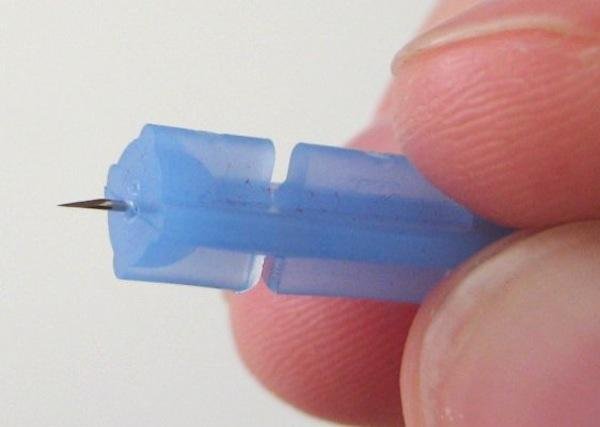A lancet, for finger-prick blood testing. (CC)
The U.S. Preventive Services Task Force has reversed its earlier position and recommended hepatitis C testing for baby boomers, or those born between 1945 and 1965.
The task force previously said there was insufficient evidence proving the benefit of screening baby boomers for hepatitis C.
Though the infection can be fatal if it progresses into liver cancer or liver cirrhosis, studies show that just 6 percent of people infected will eventually die from liver complications, and between 7 and 24 percent will develop cirrhosis within 20 years of infection.
The task force updated its position based on new clinical data showing a stronger link between diagnosis and treatment for hepatitis C and lowered risk of mortality.
Improved cure rates and reduced treatment duration achieved by drugs from Merck & Co. and Vertex Pharmaceuticals and new noninvasive screening methods contributed to the decision.
The task force is an independent organization of medical experts that advises Congress on preventive medicine. New federal health law will require many private insurers to cover procedures recommended by the task force.
According to the Centers for Disease Control (CDC), as many as 75 percent of those living with hepatitis C don't know they're infected. The CDC recommended screening last year noting hepatitis C killed 15,000 people in 2007, the most recent year for which data was available, more than those who died from HIV and AIDS.
The task force recommends one-time testing of baby boomers, which could lead to an estimated 800,000 additional diagnoses, according to the CDC.
It is believed many people in the boomer age cohort either don't remember or are afraid to admit past drug use, or they may have had transfusions before the blood supply was screened. The task force also recommends that people with a history of intravenous drug use or who received blood transfusions prior to 1992 be tested.
It is estimated that thousands of patients are awaiting regulatory approval of new drugs before undergoing treatment for hepatitis C. Johnson and Johnson and Gilead Sciences are trying to bring new drugs to market that could reduce treatment times to as few as 12 weeks.















